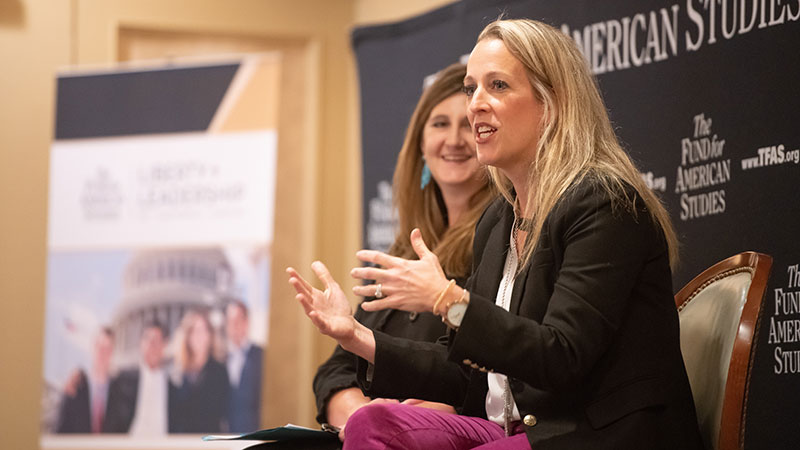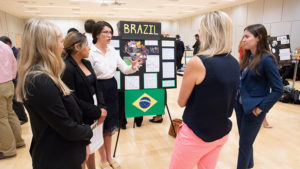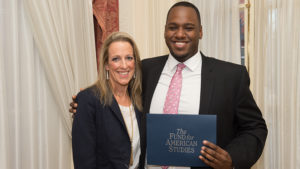
Dr. Anne Bradley is the George and Sally Mayer Fellow for Economic Education and TFAS academic director. Through this position, Dr. Bradley works to enhance the impact and reach of TFAS economic education programs through courses, seminars, videos and social media. She also delivers lectures around the country and oversees curriculum development and evaluation for economics courses. Below, Dr. Bradley talks about how she encourages TFAS students to leave behind their partisan affiliations and don their economic thinking hats in her classroom. You can hear Dr. Bradley speak at our 2019 TFAS Annual Conference in Washington, D.C. this June.
What do you want your students to get out of your economics classes?
AB: My goal is for them to walk away with a lot of enthusiasm about economics, but also to empower them with an analytical framework that allows them to think about all sorts of issues they care about. I understand that they’re not all going to convert their majors to economics, but I want them to realize how economics can make them better at what they want to do.
How do you deal with students who have never had economics or have been taught the wrong economics?

AB: On the first day, I give them a quiz that is open-ended – a non-multiple choice quiz. It’s 10 questions about basic data that anybody could find in a few minutes using Google. Questions like: What percent of the American workforce receives minimum wage? What is the average corporate profit rate? How much has global poverty changed in the last 40 years? I don’t expect that they know them all, but I want to assess where they are because I know they each have deep opinions about the policies around those things. And they really panic because they know they didn’t get any of it right. I flip through some answers, and I just shout them out anonymously. Invariably some will say 80% for the average corporate profit. Then I’ll say, “If you think the average corporate profit rate is 80%, you should probably just go start any business because you have a very high likelihood of success.”
So the point is, on the first day we have some humility – meaning we don’t know everything that we think we know. The first part of changing the world is to understand that we need to be humble, gather good research and then have the economic tools to get to the better solution.
How do you get students to look beyond their political biases?
AB: I tell them, “Take your political hat off and put on your economics hat.” And that really liberates them because it says, “I don’t have to think what my parent who votes this way wants me to think.” I can say, “What does economics say about the minimum wage?” If we really want to do right by the poor then we have to figure out what is the right policy. They like that because they feel they have a voice. They have a new way that empowers them to rise above the political arguments. I say, “Let’s use economics to allow us to carefully and thoughtfully wade through these very difficult issues, but in a way that we are free to figure out what real truth is.”
I tell them, ‘Take your political hat off and put on your economics hat.’ And that really liberates them because it says, ‘I don’t have to think what my parent who votes this way wants me to think.'”
– Dr. Anne Bradley, TFAS Academic Director

What do you hope students do with the economic knowledge they gain?
AB: Just speaking from a material wealth perspective, the last 250 years have been profound and unprecedented, and I want them to walk away grateful for being able to benefit from that. I want them to know that we can extend that to our fellow human beings who don’t experience that wealth. I know that they can be part of the solution whether they do development work abroad, work in Washington or go on to become teachers – whatever they choose to do. The economic way of thinking can empower them to be better at what they do.
Register today for the 2019 TFAS Annual Conference to learn more from Dr. Bradley and other members of the TFAS faculty during our “A Day in the Life of a TFAS Student” breakout sessions.

